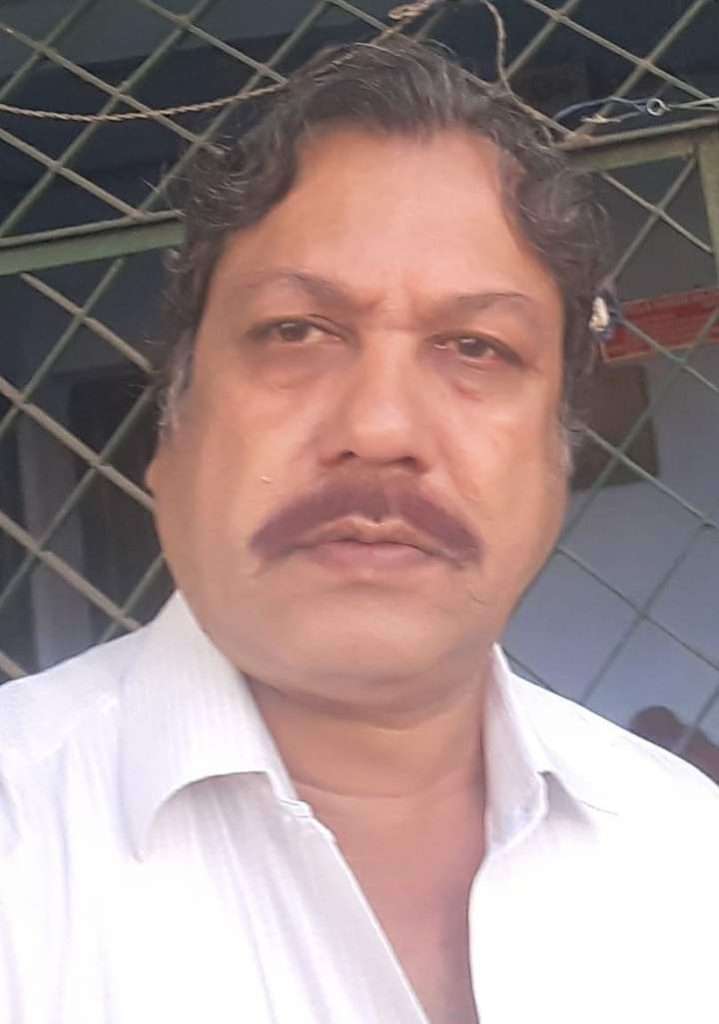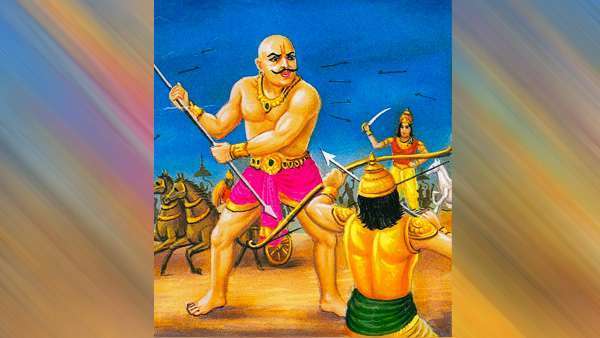Ghatotkacha is a prominent character in the epic Mahabharata. Literally, ‘Ghatam’ means pot and ‘Utkacha’ means hairless. He had a pot-like head which was hairless. Being the son of Pandava Bhima and demoness Hidimba or Hidimbi, he was half-human and half-demon, possessing a gigantic figure. Despite being half-demon, certain qualities of his have made him immortal through the ages. One story from the epic Mahabharata about him goes as follows:
It was the time of the Dwapara era or ‘Yuga’. The great Mahabharata war had already begun with the fight between the Pandavas and the Kauravas at its peak. After Pitamaha Bhishma and Guru Dronacharya, it was the turn of Karna, the great warrior, to be the commander of the Kaurava army. At this time, to come to the help of the Pandavas in the war, Veer Ghatotkacha, Mahabali Bhim’s son, had appeared on the scene. He could even challenge the might of his father. Srikrishna was aware of this fact and had accordingly invited him to join the war. From the very beginning, Srikrishna had told him, “Veer Ghatotkacha, I have invited you to join the war for a special reason. You just start your fight against the Kauravas. You will know everything when the right time comes.”
As a great fighter, Ghatotkacha stunned the Kaurava army with his warfare and terrorized them. It was not an easy task to defeat him on the battlefield. The Kaurava soldiers were massacred, and a hue and cry were raised on the battlefield when Ghatotkacha caused havoc. At long last, Ghatotkacha marched towards Duryodhan. He was fighting alongside his uncle Shakuni. There was a tremendous fight between the two. Both Duryodhan and Shakuni had to retreat. Finding no other way out, they had to seek shelter under Karna. Karna tried his level best to protect both of them from the wrath of Ghatotkacha, but he could not succeed. Ghatotkacha was not only a great warrior but also invincible. Duryodhan and Shakuni were at their wit’s end. They made Karna their target and said harsh words to him. He was selfish and not their true friend or ‘Sakha’. But it was not easy to defeat Ghatotkacha in a straight fight. Karna had a deadly weapon (Vasavi Shakti) at his disposal, which he had preserved to kill Veer Arjun. Lord Indra, while taking the ‘Kavacha Kundala’ from Karna, had given the Vasavi Shakti to him with the boon that it could be used only once when his life would be in danger and would go back to Indra after killing the enemy or opponent. Karna refused to deploy the weapon against Ghatotkacha and turned down the repeated requests of Duryodhan and Shakuni in this regard. But at long last, without being able to listen to their harsh words, he hurled the Vasavi Shakti against Ghatotkacha. He fell down and died on the battlefield, thereby saving the lives of Shakuni and Duryodhan. What Shrikrishna wanted had also come true. He had already told Veer Ghatotkacha before, “You have to sit on the altar of sacrifice at the opportune moment.” Ghatotkacha exactly did this, which has made him immortal in the annals of history.
We learn the right lesson from this story of the Mahabharata. The life of Arjun was saved by the sacrifice of Ghatotkacha, and Karna also lost the deadly weapon on account of Duryodhan, by means of which he could have saved his own life by killing Arjun. Subsequently, Arjun had killed Karna on the battlefield.
We have to learn a lot from this story of the Mahabharata, keeping in view the present conditions in society. Man is turning out to be not only selfish but also materialistic. He wants to complete his work somehow, regardless of sacrifice. There is heavy traffic at the chowk without even room for a mustard seed. But he never discards the desire of taking out his bike in the midst of vehicles. Even if there are long queues in front of ATM booths and railway counters, he only thinks of how his number would come first. Does he have the time to think of others? No. Only for him, time is important. Only his work is important. Others’ work and time are neither valuable nor important. To grab a good job, to have a nice building, to increase the bank balance, etc. have become the main objectives of man today. We often hear people saying, “I have got my paternal house. In addition to that, I have taken an apartment in the town. I have also purchased a plot. I have given the advance for another apartment in the capital.” People use to get a lot of pleasure from this type of talk. What shall one do with so many houses! Shall he carry all this off at the time of leaving this mundane world! It is really difficult to convince and make people understand.
Everybody lives. But one who lives for others, discards one’s selfish interests and makes sacrifices in one’s life gets justified, and one becomes immortal. Ghatotkacha, the epitome of sacrifice, lived valiantly and died for a cause which has made him a memorable figure in the whole of the Mahabharata. There are even temples in Uttarakhand, Himachal Pradesh, and Java constructed in his honor. Numerous movies and TV serials have been made on his character. Comics have also been written on him. His has been a popular character in Balinese and Javanese versions of the Mahabharata. His life and sacrifice have been exemplary. At least we should learn this lesson from the culture, tradition, and the ‘Shastras-Puranas’ of our country.
(The views expressed are the writer’s own)

Mr. Prafulla Kumar Majhi,
Retired Asst. Director, A. I. R, is an eminent Scholar and freelance writer in English & Odia. His areas of interests are sociocultural, economic, literary, historical and analytical studies and writings.

